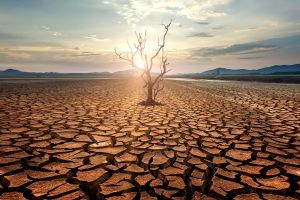Facts, feeling and fearmongering: The state of climate change

“Facts don’t care for your feelings.” Ben Shapiro’s frequent use of it in debates has made this statement popular.
Facts, as commonly understood, are objectively true, and indicators of the reality around us. They are solid and unassailable. Feelings are subjective and constantly subject to change. This is important, regardless of what one thinks of Shapiro’s politics.
President Obama said much the same in his 2018 Mandela lecture. He stressed the need to make key decisions based on facts. “You have to believe in facts,” said Obama. “Without facts there is no basis for cooperation. … If I say this is a podium and you say this is an elephant, it is going to be hard for us to cooperate.”
Of course, no one is saying we should completely disregard feelings. The point is simply that it’s a mistake to let feelings, which may or may not correspond to reality, play the decisive role in public policy debates.
Sadly, too many political leaders today are concerned more about feelings than facts. It is not unusual to see facts sacrificed at the altar of feelings and emotion. Such an attitude encourages people to live in a bubble that leaves them unprepared and dumbfounded when facts challenge their imaginary worlds.
All of this is particularly relevant in the climate change debate. Increasingly, climate science has become a victim of empathy-based doomsday propaganda. Our world has been inundated with climate doomsday theories that are detached from real world facts.
Ironically, President Obama contributed to that tendency in that very lecture, despite his emphasizing the importance of facts. In addressing the issue of climate change, he remarked that there are facts which comprehensively prove climate change to be real.
Well, to be sure, climate change is real in the sense that the climate is always changing. But what has become increasingly unclear in the debate is how much the magnitude of change in our climate has been exaggerated and how much scientific facts have given way to feelings as advocates appeal to people’s empathy rather than feeding their intellect by presenting real-world climate facts.
Since the early days of “The Climategate Scandal”—when leaked emails from my university’s climate research center revealed how climate scientists worldwide manipulated temperature data to make global warming appear dangerous—it has become increasingly clear that climate policies are forced on people based on scaremongering tactics.
Previously, we’ve seen concerns about over-population, ozone depletion, and ocean acidification promoted as events that will result in global catastrophe. When the apocalyptic claims associated with these earlier doomsday events did not materialize and facts eventually showed that they posed no risk to the planet or life forms, these issues faded.
Doomsayers, in the mid-2000s, then turned their focus to global warming. This time, however, they were more innovative in dealing with contrary information. When global temperatures failed to increase to significant levels and consensus emerged among scientists that current warming is not unprecedented, the key phrase was changed from “global warming” to “climate change,” which conveniently allows for both warming and cooling.
Further, in order to prevent any skepticism toward their theory, the doomsayers now attribute every weather event to “climate change,” i.e., human-induced global warming. Record cold and record snow are now termed “evidence and signatures” of global warming.
From the imaginary sea-level rise and disappearance of beachfront real estate properties in Miami, to ice-free Arctic summers, the mythological fantasy of climate doomsayers has no bounds.
In the mid-2000s, they exploited the sympathy tactic by expressing concern about the effect of warming on polar bears. And when polar bear populations increased and were proven to be much healthier than before, the doomsayers came up with the yet ridiculous claim that climate change will trigger a mass extinction of a million species.
From claims about the rate of increase in temperature to those detailing the impact of carbon dioxide on our temperature levels, the entire climate doomsday movement is based on emotion-based reasoning. The doomsayers continue to make extraordinary claims without scientific proof, deliberately exaggerating and manipulating facts to suit their doomsday narrative with the objective of instilling climate-fear in people and encouraging them to join the doomsday movement. Despite humans’ being called a “cancer on earth,” people still fall for this trick. The movement has been particularly successful with school children, persuading many to believe that their world is doomed, leading them to protest in the streets against an imaginary doomsday that is nowhere to be seen.
All of this inhibits real progress in meeting the challenges facing our world. Both fear and guilt—indoctrinated among the masses by the mainstream media and doomsayers—act as stumbling blocks to communicating climate reality to the people. And the progress of the climate sciences too, is currently stuck in the matrix of political climate games and biased academicians who manipulate data to support their political objectives.
Vijay Jayaraj (M.Sc., Environmental Science, University of East Anglia, England), Research Associate for Developing Countries for the Cornwall Alliance for the Stewardship of Creation, lives in Bangalore, India.



























